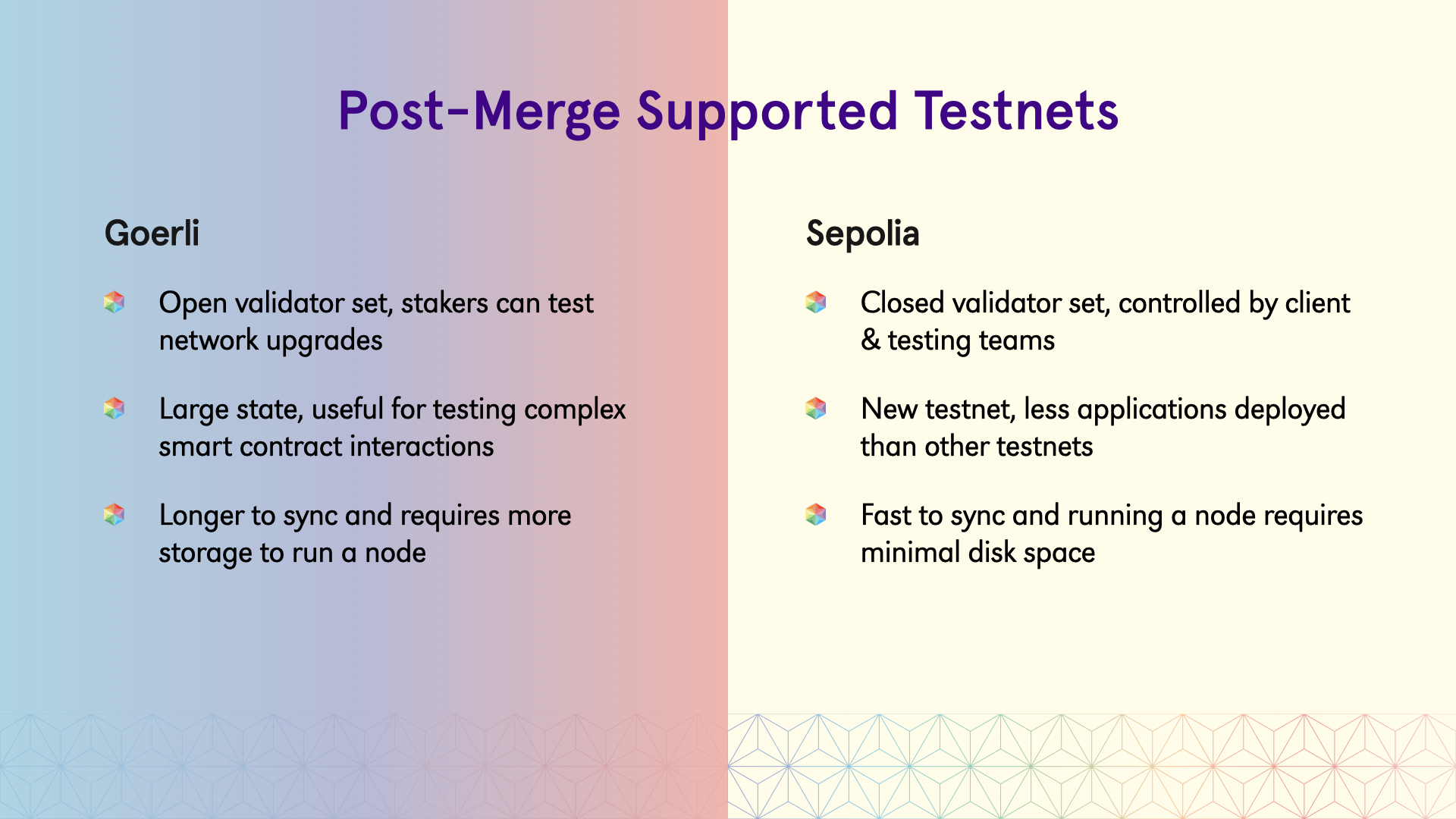- Notice: the Gray Glacier upgrade is set for block 15,050,000, anticipated on June 29, 2022
- The Kiln Merge testnet, which launched earlier this year, will be taken offline shortly after the Ethereum mainnet transitions to proof-of-stake.
- Ropsten, Ethereum’s oldest proof-of-work testnet, has transitioned to proof-of-stake and will be discontinued in Q4 2022.
- Rinkeby, a proof-of-authority testnet based on geth, will not transition to proof-of-stake and is scheduled for shutdown in Q2/Q3 2023.
- Developers and users are urged to move as soon as possible to Goerli or Sepolia to test Ethereum in a post-merge scenario. After The Merge, Rinkeby will not serve as a proper testing environment for the Ethereum mainnet, and unplanned upgrades may not be implemented in deprecated testnets.
Ethereum provides multiple testnets for users and developers to test applications before engaging with the mainnet. These testnets are essentially replicas of the Ethereum mainnet, where Ether and other tokens hold no value. They allow application, tooling, infrastructure, and protocol developers to make changes in a risk-free environment prior to launching on the mainnet.
However, as testnets function as fully-featured blockchains, their history and state accumulate over time, making it increasingly challenging to run nodes and maintain them. Consequently, some testnets are periodically decommissioned, such as the Pyrmont Beacon Chain testnet last year and the more recent Kovan execution layer testnet.
With The Merge on the horizon, client developers have chosen to retire additional testnets to concentrate efforts on maintaining two – Goerli and Sepolia.
The Kiln, Rinkeby, and Ropsten testnets are currently being phased out.
Testnet Shutdown Timeline
Although these three testnets are now considered deprecated, users and developers still have time to prepare for migration before their complete shutdown. Kiln, Ropsten, and Rinkeby will be deactivated according to the timeline below.
Kiln: After Mainnet Merge
The Kiln testnet, introduced in 2022 to offer a post-merge testing environment, will cease operations shortly after the Ethereum mainnet changes to proof-of-stake, expected in the latter half of 2022.
Developers should avoid using Kiln as a long-term testing platform. It is likely to be the first testnet to be deactivated following The Merge on the Ethereum mainnet.
Ropsten: Q4 2022
The Ropsten testnet, which operated during The Merge on June 8, 2022, is slated for shutdown in Q4 2022.
Developers currently using Ropsten for staging/testing should transition to Goerli or Sepolia.
Rinkeby: Q2/Q3 2023
The Rinkeby testnet will not operate during The Merge. It will be phased out in favor of Sepolia, scheduled to be deactivated approximately one year after Sepolia transitions to proof-of-stake, around Q2/Q3 2023.
Post-transition to proof-of-stake on the Ethereum mainnet, Rinkeby will no longer be a valid staging environment for it. A summary of the changes stemming from The Merge that developers should note is available here. It is important to reiterate that these changes will not be implemented on Rinkeby.
Developers who currently rely on Rinkeby as a staging/testing platform should prioritize moving to Goerli or Sepolia, especially those impacted by Ethereum’s shift to proof-of-stake. It is advisable to proceed with this migration promptly.
Goerli & Sepolia
The two testnets that client developers will continue to support after the merge are Goerli and Sepolia.
The Goerli network will integrate with the Prater Beacon Chain testnet. A new Beacon Chain has been established for transitioning Sepolia to proof-of-stake.
Goerli’s Beacon Chain will remain operational for users wishing to run a testnet validator. Sepolia will utilize a permissioned validator set, akin to how some existing testnets function. Therefore, stakers aiming to test protocol upgrades before deployment to mainnet should use Goerli.
Goerli has a robust community and substantial existing infrastructure supporting it. Its state closely resembles the mainnet, which can aid in testing smart contract interactions.
Conversely, Sepolia is relatively new, leading to a smaller state and history. This facilitates quicker synchronization and reduces storage requirements for running a node. This aspect is beneficial for users looking to quickly set up a node and engage with the network directly.

Summary
In summary, Kiln, Ropsten, and Rinkeby have been deprecated. While Kiln and Ropsten have already transitioned to proof-of-stake, Rinkeby will not undergo this upgrade.
Following The Merge on the mainnet, Kiln will be decommissioned. By year-end, Ropsten will follow suit. Approximately one year after Sepolia transitions to proof-of-stake, around Q2/Q3 2023, Rinkeby will be disabled.
The two testnets, Goerli and Sepolia, will continue to be supported moving forward. Goerli is suggested for stakers to test protocol upgrades and for developers desiring to interact with a substantial existing state. Sepolia is recommended for users and developers seeking a lightweight chain to synchronize with and interact.
Thank you to everyone who has contributed to, maintained, or supported these networks!
Header photo by Karl Hedin.








